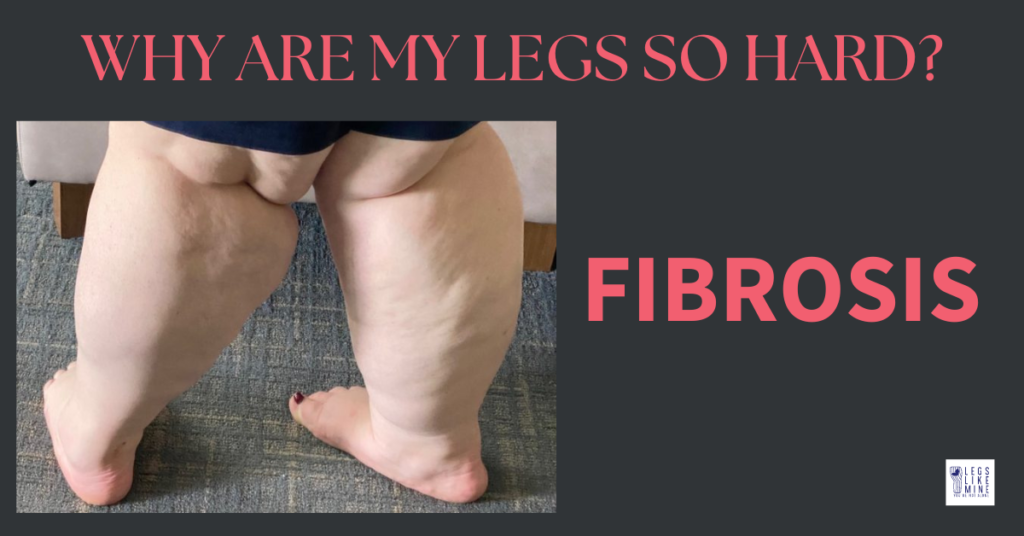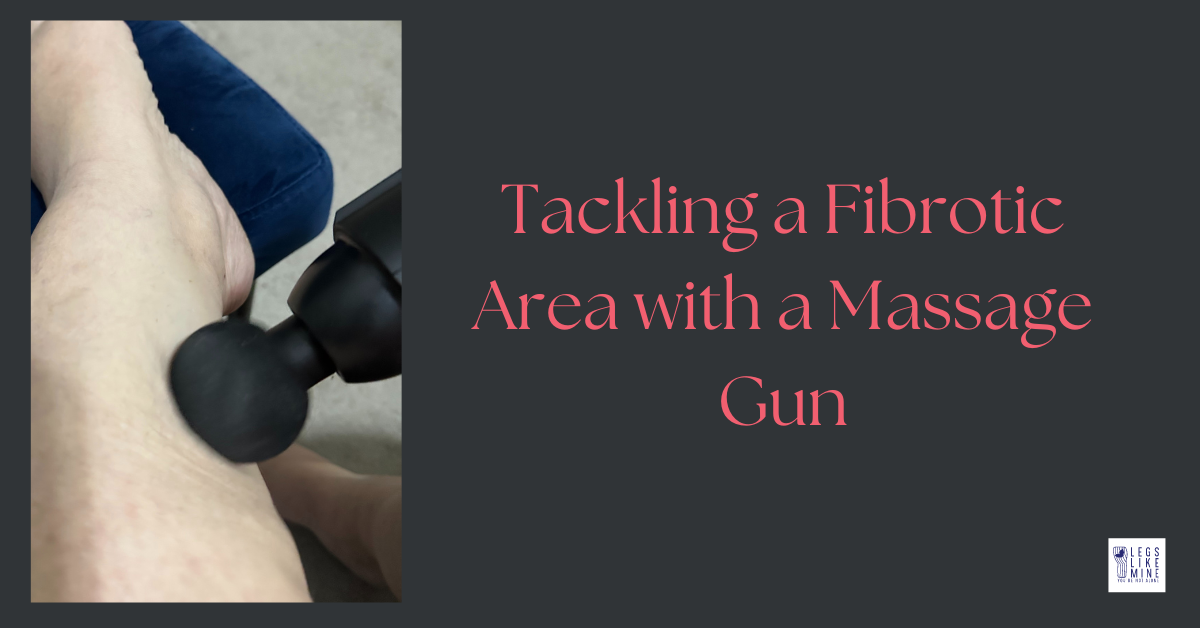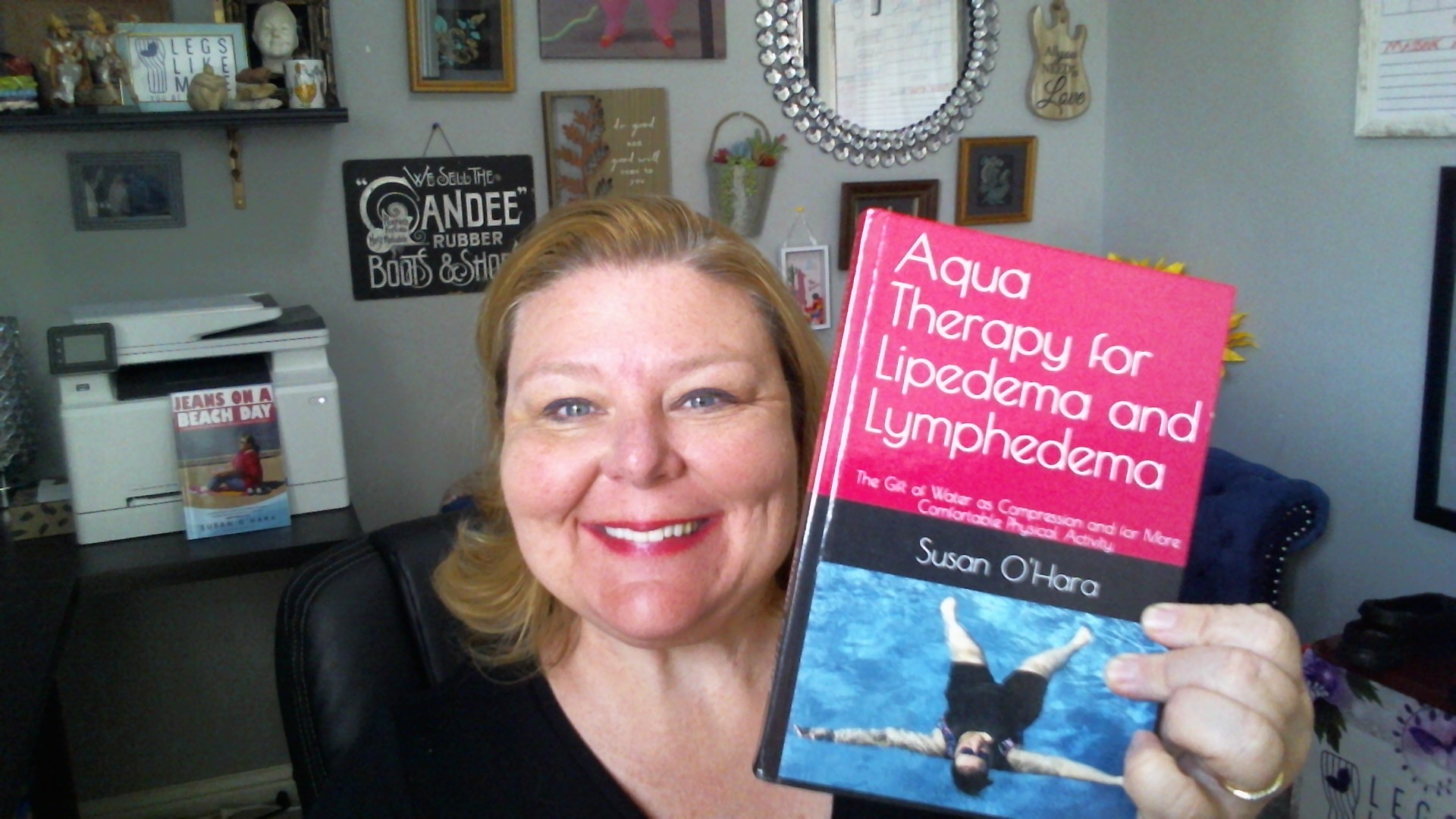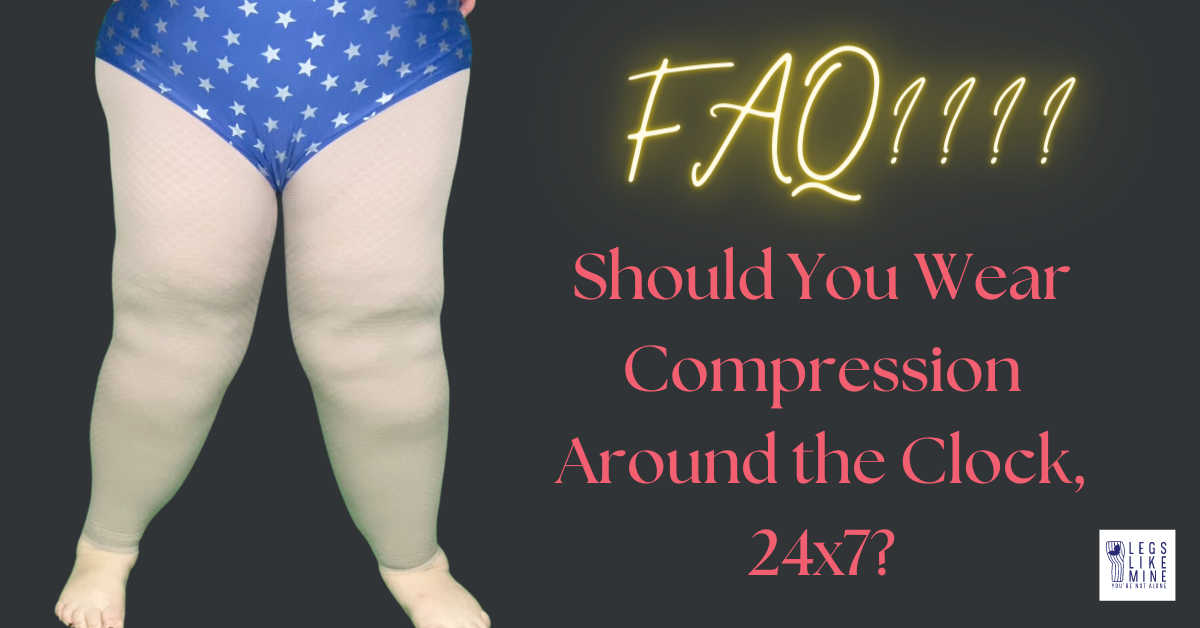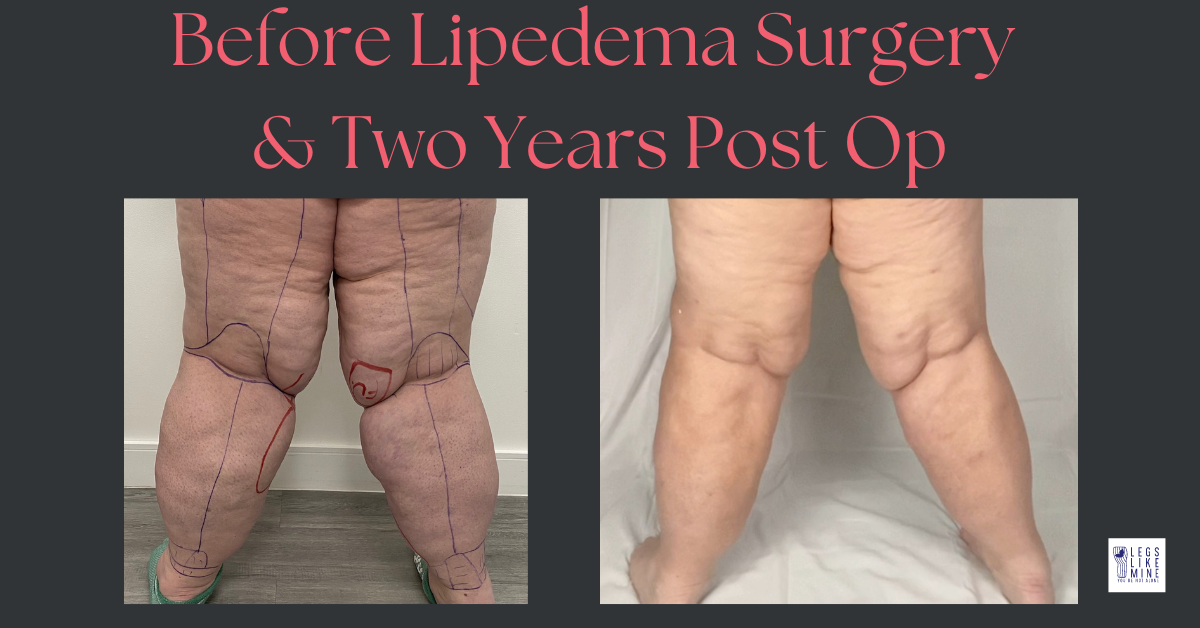Hi friends!
Let’s talk about fibrosis. We don’t talk about it enough and its a pretty big, actually MAJOR issue for women with lipedema. This is an area where I’m still learning so I highly advise consulting your certified lymphedema therapist or PT for assistance. And if you look at my picture below, you’ll see that I was once in a really terrible state when it came to having fibrotic tissue. Those are my legs!
Today I’m working my left leg (yes, that’s already had surgery on it three times) with my massage gun, and then the vibration plate, because I’m noticing some hardened tissue there. I remember when I had my first surgery, my doctor told me he worked and worked in this area to remove fibrotic tissue. Had I known then what I know now, I would have done a lot of preoperative care to reduce the fibrosis, not only to make it easier on my surgeon, but to get better long-term results in reducing lipedema-related pain and symptoms.
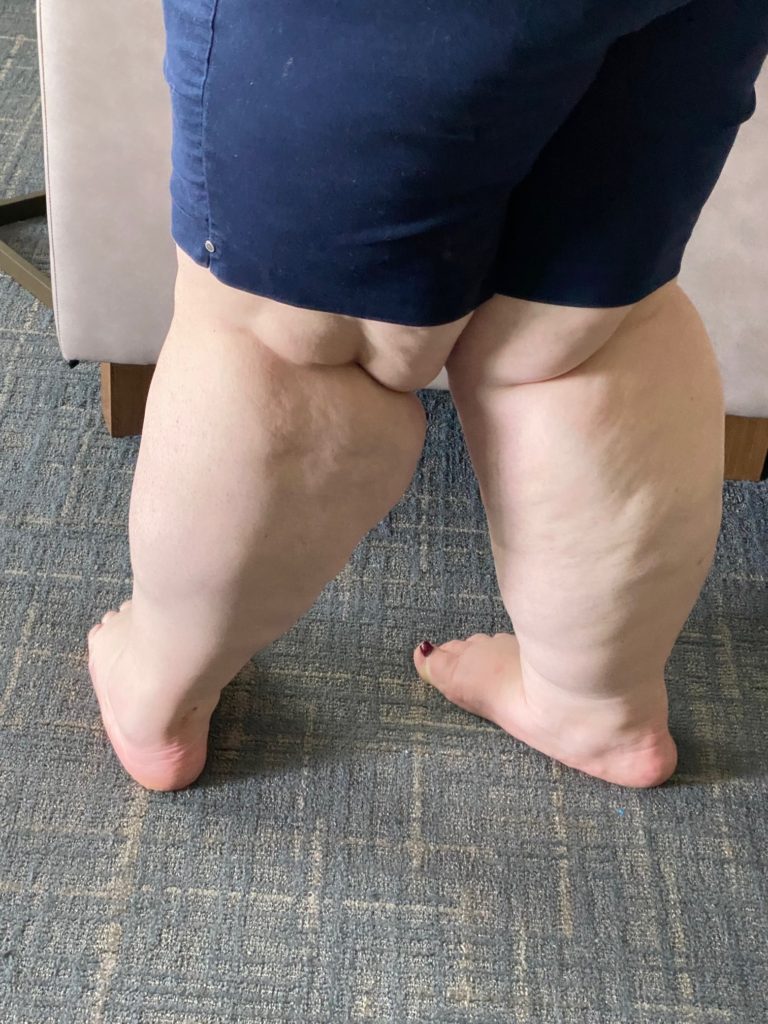
The night before my first lipedema reduction surgery. Very, very fibrous tissue here. The left leg ‘flap’ moved as one solid piece.
A lot of us new to the wonderful world of lipedema aren’t yet versed in fibrosis so I wanted to share a little bit of information on it. I noticed on social media recently, that Dr. David Amron is talking about fibrosis on his channels, and how he wants his patients to prep for surgery, and I think that is such a brilliant idea. Here are a few things about fibrosis for you!
How Does Fibrosis Even Start?
Lipedema is a chronic condition characterized by an abnormal buildup of subcutaneous adipose tissue (SAT) that can lead to significant swelling, particularly in the lower extremities. Over time, this persistent swelling can result in the development of fibrosis, which is the formation of excess fibrous connective tissue. Fibrosis can cause the affected areas to become hardened, painful, and increasingly difficult to manage. Friends, this is why we wear compression and do massage – we have to keep the swelling at bay because it literally compounds our condition!
Understanding Fibrosis in Lipedema
As lipedema progresses, chronic inflammation within the SAT leads to fibrotic damage. The SAT and nodules grow larger and become harder, further exacerbating the swelling and discomfort. This fibrotic process can also damage the lymphatic vessels, leading to a condition known as lipo-lymphedema, where the lymphatic system becomes impaired, compounding the swelling and increasing the risk of complications.
Managing and Reducing Fibrosis
While there is no cure for lipedema, several proven strategies can help manage and potentially reduce fibrosis caused by long-term swelling:
- Complete Decongestive Therapy (CDT): This comprehensive approach combines manual lymphatic drainage (MLD), compression therapy, exercise, and skincare. MLD, a gentle massage technique, can help encourage the movement of lymph fluids, reducing swelling and improving circulation in affected areas. Compression garments or bandages can also assist in managing swelling and preventing further fibrotic damage. I know a lot of us really, really hate being wrapped. But sometimes if your swelling is out of control, we have to go the route of CDT to get it down.
- Using Pneumatic Pumps: Many of us have at-home pumps or have the use of them in our provider’s offices to use. Some of us use the pumps (even several times) daily, while others opt to save them for when things get really bad. One thing is for sure, they are proven to get the lymphatic fluid up and out. And the less dormant fluid we have in our bodies, the less chance we have of developing fibrosis. Companies like LymphaPress, FlexiTouch, and Airos are some of the leaders in the medical grade pump arena.
- Lymphatic Massage: Similar to MLD, lymphatic massage techniques can help stimulate the lymphatic system, promoting fluid drainage and potentially reducing fibrosis over time. Again, there are options here. I highly recommend seeing a certified lymphedema therapist to not only perform MLD, but to teach you your daily routine for MLD. It’s important to have the tools at your own fingertips so you’re not dependent on someone else for life to do MLD for you.
- Exercise and Movement: Regular low-impact exercise, such as walking, swimming, or cycling, can help improve lymphatic flow and reduce swelling. However, it’s essential to consult with a healthcare professional to determine the appropriate exercise regimen based on the individual’s condition. Of course, I am a huge proponent of swimming, because you get movement plus hydrostatic compression to help squeeze the fluids up and out. See my book, Aqua Therapy for Lipedema and Lymphedema for more information.
- Dietary Modifications: Ugh. I know. Taboo subject, but guess what. DIET IS A MAJOR PART of Managing Lipedema, no matter what “they” tell you. I said it. I struggle with it, but it’s my job to say it. While diet alone cannot cure lipedema, some individuals may find that reducing inflammatory foods and incorporating anti-inflammatory nutrients can help manage swelling and potentially slow the progression of fibrosis. Many women will get “food sensitivity testing” done to understand more about what foods are inflammation triggers, while other women opt to use ways of eating like FODMAP to reduce inflammation. Check out the Low FODMAP Diet Book here.
- Compression Garments: Wearing properly fitted compression garments can help prevent further fluid accumulation and potentially reduce existing swelling, which may slow the development of fibrosis.
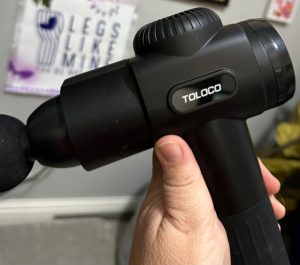
There are numerous brands of massage guns available at a range of price points. I use this relatively inexpensive brand and it seems to…massage. LOL!
7. Massage Guns and Other Devices: BE CAREFUL here! Before I knew what was going on with my legs, I’d rubbed them with rolling pins, bruised myself black and blue using a fascia blaster (which I threw away), and used all kinds of things to torture my legs. I now employ the use of a massage gun, GENTLY to try and break up areas of fibrosis. I do this before getting in the pool, using a vibration plate, or doing MLD and using compression. The efforts your making to reduce swelling will improve and lymphatic fluid will flow more freely if it’s not fighting fibrosis. Again, get some professional training here and don’t damage your tissue further if you go this way.
It’s important to note that managing fibrosis in lipedema requires a lot of help and, like everything else lipedema related, your own ongoing commitment. Early intervention and consistent treatment are crucial to preventing further progression and potential complications. Keeping fibrosis at bay is one of the key aspects of retaining mobility.
I hope this is helpful. Also, I highly recommend looking up Linda Anne Kahn or Karen Ashforth online as they are truly experts in this area.
Best of luck to you in staying loosy-goosy and not hardened up. It’s important.
Susan
Some Sources for You:
Buso, G., Depairon, M., Tomson, D., Raffoul, W., Vettor, R., & Mazzolai, L. (2019). Lymphatic Massage Ameliorates Pathological Fibro-Adipose Tissue Components in Lipoedema. The Journal of Clinical Endocrinology & Metabolism, 104(12), 6304-6317.
Eakin, Guy, and The Lipedema Foundation. The Fluid Nature of Edema in Lipedema. https://www.lipedema.org/blog/2022/10/7/fuecwuob1c6n65hewfdm74win58ram
Fife, C. E., Maus, E. A., & Carter, M. J. (2010). Lipedema: A Frequently Misdiagnosed and Misunderstood Fatty Deposition Syndrome. Advances in Skin & Wound Care, 23(2), 81-92.
Herbst, K. L. (2012). Lipedema: An Overview. Lymphedema Management, 4(1), 14-18.Wounds International. (2021). Lipedema: A Chronic Adipose Tissue Disorder. Retrieved from https://www.woundsinternational.com/resources/details/lipedema-chronic-adipose-tissue-disorder
Lymphatic Education & Research Network. Understanding Fibrosis in Lipedema: Inflamed Subcuteneous Adipose Tissue (SAT), and Nodules. July 2019. https://lymphaticnetwork.org/news-events/understanding-fibrosis-in-lipedema-inflamed-subcutaneous-adipose-tissue-sat
Contains paid ads. As an Amazon associate, I receive earnings on your purchases.
